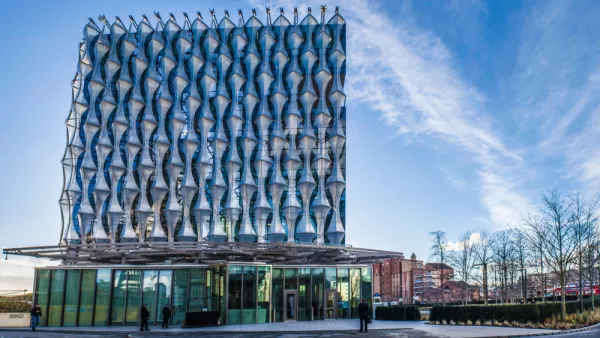The battle over the efficiencies and infrastructure required in building codes continues.

In March 2021, the International Code Council (ICC), a private consortium that controls building code regulations for most of the United States and Latin America, voted to "reduce the power of cities and local jurisdictions over building efficiency requirements," according to March 2021 Planetizen coverage of the news.
The ICC's vote came as a final, sweeping blow in a long battle by industry powers to push back against local control over local building and energy laws. With its March 2021 vote, the ICC decided to remove code making powers from local governments, placing those responsibilities instead in the hands of a "technocratic committee that gives companies equal say to public servants," according to Alexander C. Kaufman, writing for the Huffington Post (Kaufman also provided breaking new coverage of the ICC vote in March 2021).
Kaufman is still tracking the ongoing battle over carbon emissions from the nation's building stock. In March 2022, Kaufman reports that "new drama is afoot" at the ICC, after "a single email secretly sent by a gas utility nearly gutted a proposal widely seen as vital to increasing the adoption of electric vehicles."
Here are the salient details of the drama:
After weeks of discussion over a proposal to require developers to include the circuitry to charge electric vehicles in more new buildings ― which can cost more than six times more to retrofit into a structure after it’s built ― the chairman of the committee, Duane Jonlin, abruptly announced in an email that he had decided to strike the proposal from the code. Instead, he said it belonged in the “appendix” that serves as a bonus menu that some more ambitious cities and towns may choose to adopt, according to copies of the exchange HuffPost obtained from a source who requested anonymity because the internal emails were private.
Kaufman and the HuffPost team dig deeper via public records request, reporting that Spire Energy, the $3.5 billion St. Louis-based gas company, "privately reached out to challenge the electric vehicle provisions."
According to Kaufman, environmentalists and code reform advocates fear the incident reveals broader leverage for polluters in building codes than before last year's vote.
FULL STORY: A Battle Over Building Codes May Be The Most Important Climate Fight You’ve Never Heard Of

National Parks Layoffs Will Cause Communities to Lose Billions
Thousands of essential park workers were laid off this week, just before the busy spring break season.

Retro-silient?: America’s First “Eco-burb,” The Woodlands Turns 50
A master-planned community north of Houston offers lessons on green infrastructure and resilient design, but falls short of its founder’s lofty affordability and walkability goals.

Delivering for America Plan Will Downgrade Mail Service in at Least 49.5 Percent of Zip Codes
Republican and Democrat lawmakers criticize the plan for its disproportionate negative impact on rural communities.

Test News Post 1
This is a summary

Test News Headline 46
Test for the image on the front page.

Balancing Bombs and Butterflies: How the National Guard Protects a Rare Species
The National Guard at Fort Indiantown Gap uses GIS technology and land management strategies to balance military training with conservation efforts, ensuring the survival of the rare eastern regal fritillary butterfly.
Urban Design for Planners 1: Software Tools
This six-course series explores essential urban design concepts using open source software and equips planners with the tools they need to participate fully in the urban design process.
Planning for Universal Design
Learn the tools for implementing Universal Design in planning regulations.
EMC Planning Group, Inc.
Planetizen
Planetizen
Mpact (formerly Rail~Volution)
Great Falls Development Authority, Inc.
HUDs Office of Policy Development and Research
NYU Wagner Graduate School of Public Service





























